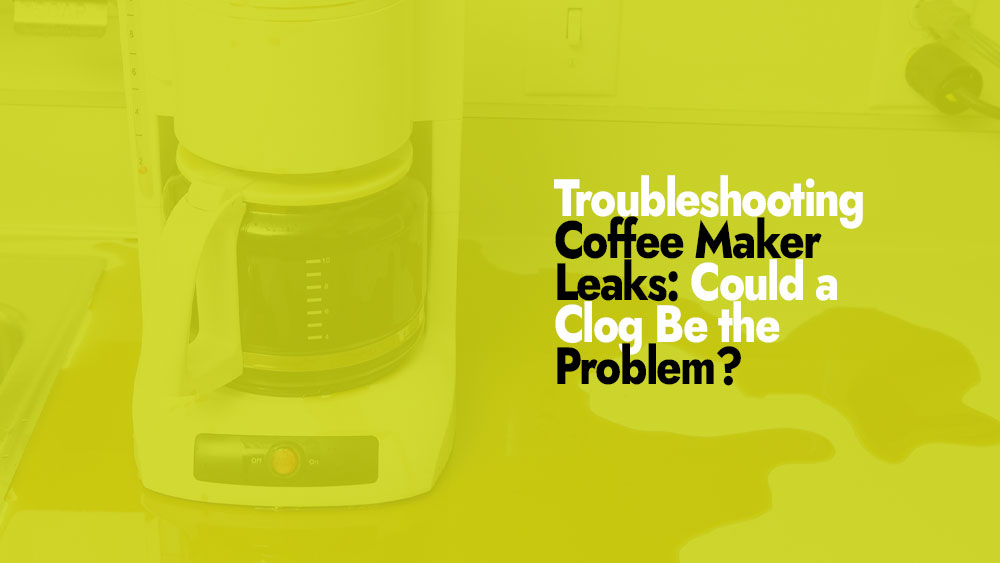As an Amazon Associate, I earn from qualifying purchases at no extra cost to you.
Troubleshooting Coffee Maker Leaks: Could a Clog Be the Problem?
Coffee makers are a staple in many households, providing us with a much-needed jolt of caffeine to start our day. However, like any other appliance, they can experience issues over time. One common problem that coffee maker owners may encounter is water leakage. While there can be various reasons behind a coffee maker leaking water, one potential culprit is a clogged coffee maker. In this guide, we will explore the connection between a clogged coffee maker and water leakage, as well as offer solutions to address this issue effectively.

Understanding the Mechanism of a Coffee Maker
To comprehend how a clogged coffee maker can lead to water leakage, it’s important to understand the basic workings of the appliance. Most coffee makers consist of a water reservoir, a heating element, a pump, and a drip mechanism. The water reservoir holds the water, which is then heated by the heating element. Once heated, the water is pumped up through a tube and dispersed over the coffee grounds, allowing the brewed coffee to drip into a pot or cup below.
How a Clogged Coffee Maker Can Cause Water Leakage
Impaired Water Flow
When a coffee maker becomes clogged, the flow of water can be significantly hindered. This obstruction can occur due to a buildup of mineral deposits from hard water or the accumulation of coffee grounds and oils. As a result, the water cannot pass through the system as smoothly as it should. This restricted water flow can lead to excess pressure within the coffee maker, causing leaks to occur at weak points, such as around the seams or joints.
Backpressure Buildup
A clogged coffee maker can also lead to an increase in back pressure. When the normal flow of water is impeded, the heating element may continue to heat the water, causing steam and pressure to build up inside the coffee maker. This excess pressure can cause the water to find alternative paths of escape, resulting in leaks from various areas of the appliance.
Overflowing Reservoir
In some instances, a clogged coffee maker can cause the water reservoir to overflow, leading to water leakage. If the clog prevents water from flowing freely into the coffee grounds or if the drainage system is blocked, the water level in the reservoir can rise beyond its capacity. As a result, the excess water finds its way out through any available openings or weak points, causing leaks.
Solutions to Address Water Leakage from a Clogged Coffee Maker
Regular Cleaning and Descaling
To prevent clogs and subsequent water leakage, it is crucial to clean and descale your coffee maker regularly. Follow the manufacturer’s instructions for cleaning and descaling, which typically involve using a mixture of vinegar and water or a commercial descaling solution. This process helps remove mineral deposits and coffee residue, ensuring that water can flow freely through the system.
Check and Clean Filters
Coffee makers often have filters to prevent grounds from entering the brewed coffee. Over time, these filters can become clogged, hindering water flow and leading to leaks. Regularly inspect and clean these filters according to the manufacturer’s instructions. If the filter is damaged or worn out, consider replacing it to maintain optimal performance.
Use High-Quality Water
The quality of water used in your coffee maker can impact its lifespan and performance. Hard water, which contains high levels of minerals, can contribute to clogs and mineral buildup. Consider using filtered or distilled water to reduce the risk of clogging and prolong the life of your coffee maker.
Seek Professional Assistance
If you have tried the above solutions and your coffee maker continues to leak, it may be time to seek professional help. Contact the manufacturer’s customer support or consult a professional appliance repair service for guidance and assistance in diagnosing and resolving the issue.
Conclusion
A clogged coffee maker can indeed cause water to leak, primarily due to impaired water flow, backpressure buildup, or overflowing reservoirs. Regular cleaning, descaling, and filter maintenance are essential to prevent clogs and subsequent water leakage. By following these guidelines and using high-quality water, you can extend the lifespan of your coffee maker while enjoying a consistently brewed cup of joe without any leaks.
